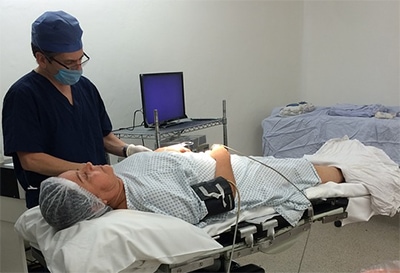Gynecologic Cancers
Cervical cancer
| Download this episode | There are five main types of gynecologic cancer and each has different signs and treatment strategies. According to the American Cancer Society, there will be an estimated 116,760 new cases diagnosed and approximately 34,080 deaths from gynecologic cancers in the U.S. in 2021. Cervical cancer used to be the most common women’s cancer but it is highly preventable now thanks to screening tests like a Pap smear, and a vaccine for human papillomavirus or HPV, the main cause of cervical cancer. An abnormal vaginal discharge or bleeding is the primary symptom of cervical cancer, which may not cause any signs in its early stages. A patient diagnosed with cervical cancer should ask to be referred to a gynecologic oncologist, a physician who has been trained to treat cancers of a woman’s reproductive system. This physician will work with the patient to create a plan that may include surgery, chemotherapy and/or radiation therapy. | Ovarian cancer causes more deaths than any other form of gynecologic cancer. But when the disease is found in its early stages, treatment is almost always effective. About 90 percent of the women who get ovarian cancer are older than 40 years of age, with the greatest number of cases occurring in women aged 60 years or older. Abdominal pain, pressure in the pelvic area and back pain are among the symptoms of ovarian cancer, which can also cause a change in bathroom habits, such as having to urinate frequently or constipation. There are no reliable screening tests for ovarian cancer that can be used in women who don’t have any of the symptoms, so it is important for women to pay attention to their bodies and know what is normal for them. A woman who displays symptoms of ovarian cancer for 2 to 3 weeks without improvement or has a family history of the disease should speak with her physician immediately about the possibility of cancer. | The uterus is the pear-shaped organ in a woman’s pelvis also known as the womb where the baby grows when she is pregnant. The most common type of uterine cancer is also called endometrial cancer because it forms in the lining of the uterus, which is called the endometrium. Women who are obese, who have taken estrogen for hormone replacement during menopause or had trouble getting pregnant are considered at risk for uterine cancer. The fourth most common cancer in women and the most commonly diagnosed gynecologic cancer, uterine cancer is usually found when women experience bleeding after menopause. It can also cause pain or pressure in the pelvis. Any woman with postmenopausal bleeding should consult with a physician right away. An endometrial biopsy or a transvaginal ultrasound may be ordered to help determine the source of the bleeding and plan a necessary course of treatment. | A woman’s risk for vaginal cancer increases as she ages, with most cases diagnosed over the age of 60. Women who have multiple sexual partners or had intercourse at an early age are considered to be at risk for this rare form of gynecologic cancer, as are women whose mothers took a drug called diethylstilbestrol or DES while pregnant in the 1950s. DES, a drug thought to help prevent miscarriages, has been linked to a certain type of vaginal cancer called clear cell adenocarcinoma. Treatment for vaginal cancer typically includes surgery and radiation therapy. Removal of all or part of the vagina may be necessary to remove all of the cancer. Radiation therapy kills quickly growing cancer cells but it can also damage nearby healthy cells so there may be some side effects. Vaginal cancer is curable when found early, which is one of the reasons why women should be encouraged to continue to have pelvic exams even later in life. | The vulva is a woman’s external genitalia and is made up of the skin and fatty tissue that surround the clitoris and the openings of the vagina and urethra. Dr. Laura Huffman of UAMS’s Department of Obstetrics and Gynecology says persistent itching or soreness in the vulvar area may be signs of vulvar cancer. Treatment for this form of cancer usually requires surgery, although radiation therapy or chemotherapy may be used if the cancer cannot be totally removed surgically. Dr. Huffman says women with vulvar cancer may have concerns about treatment options and how they will affect their sexual function and fertility, things that should be discussed with their physician before any treatment begins. Women recovering from vulvar cancer are encouraged to follow established guidelines for good health. Quitting smoking is particularly important since smoking seems to impair the immune system’s ability to cope with HPV infection.
Transcript
Ovarian cancer
Transcript
Uterine cancer
Transcript
Vaginal cancer
Transcript
Vulvar cancer
Transcript
